- Home
- Caroline Anderson
Just Another Miracle!
Just Another Miracle! Read online
“When can you start?”
About the Author
Title Page
CHAPTER ONE
CHAPTER TWO
CHAPTER THREE
CHAPTER FOUR
CHAPTER FIVE
CHAPTER SIX
CHAPTER SEVEN
CHAPTER EIGHT
CHAPTER NINE
CHAPTER TEN
EPILOGUE
Copyright
“When can you start?”
Poppy was lost. The hope in his eyes did something terminal to her insides, and that slight lift to his mouth—the cautious little twist that made her heart thud and her palms itch to cradle that firm, stubborn jaw—wiped away all her resolve. “That was a short interview,” she said instead.
James grinned, and her last vestige of self-preservation puddled at her feet. “You want to be interviewed? Fine. Tell me, Miss Taylor, what makes you think you’re qualified to look after my sons?”
She smiled weakly, and sat down at the table before her legs gave way. What had she let herself in for?
Caroline Anderson has the mind of a butterfly. She’s been a nurse, a secretary, a teacher, run her own soft-furnishing business, and has now settled on writing. She says,“I was looking for that elusive something I finally realized it was variety, and now I have it in abundance. Every book brings new horizons and new friends, and in between books I have learned to be a juggler. My teacher husband, John, and I have umpteen pets, two horse-mad daughters—Sarah and Hannah—and several acres of Suffolk that nature tries to reclaim every time we turn our backs! When I’m not writing, walking the dogs or waging war on the garden, I’m often driving around Suffolk behind the wheel of an ancient seven-and-a-half-ton horse lorry. Variety is a two-edged sword!”
Just Another Miracle!
Caroline Anderson
TORONTO • NEW YORK • LONDON
AMSTERDAM • PARIS • SYDNEY • HAMBURG
STOCKHOLM • ATHENS • TOKYO • MILAN • MADRID
PRAGUE • WARSAW • BUDAPEST • AUCKLAND
CHAPTER ONE
SHE should have known better.
If she hadn’t been so busy ogling the elegant Georgian façade framed by that magnificent cedar tree, she might have paid more attention to the screaming of her instincts.
As it was, she was totally involved with rubbernecking at the glorious symmetry of the many-paned windows, admiring the architectural grace of the fanlight over the door and the echo it found in the wide sweep of gravel on which her mother’s manky old runabout had now come to rest.
Oh, my, she thought. Oh, wow.
It was gorgeous. Not ostentatious, not pretentious, just beautiful enough to take her breath away, with the morning sun bathing the mellow cream bricks with gold and sparkling off the window-panes. She sucked in some much-needed air, then climbed out of the car, straightened her shoulders and marched up to the front door. It was slightly ajar, and she heard a clanging in the distance as she tugged the old bell-pull. In the silence that followed there was a muffled giggle.
‘Hello? Is anybody there?’ she called through the crack.
The giggle got louder, and was shushed vigorously.
She really should have known better. After all those years with Tom and David and Peter, she should have anticipated it—but she hadn’t.
Pushing open the door cautiously, she stepped in—just as the bag of flour reached head height.
The giggles escalated to a shriek, followed by the thunder of running footsteps on the stairs.
Poppy didn’t hesitate. Her wits firmly back in place, she kicked off her shoes and sprinted up the sweeping staircase after the villains.
A door slammed along to her right, and she whipped it open and caught them on the way into the wardrobe.
‘Good morning, boys,’ she said firmly, and hooked them out of their bolt-hole.
They were twins—that much was obvious. They had the skinny arms and legs of growing boys, and at rest their faces, under the wild mid-brown curls, would have been positively cherubic. However, for the first few seconds they were still caught in the high spirits of the prank, and devilment danced in their nut-brown eyes.
Poppy released them, folded her arms and waited.
The enormity of what they had done finally catching up with them, they at last stood motionless and stared at her flour-splattered form in awe.
‘Well?’ she prompted.
‘Sorry,’ they mumbled in unison.
‘You will be. Who are you?’
‘I’m George—’
‘He’s George.’
She turned to the one who wasn’t George. ‘And you are—?’
‘William.’
‘And are there any more of you?’
They shook their heads unhappily.
‘Right, George and William, you have a little domestic task to perform, I believe?’
They gazed at her blankly.
‘Cleaning up the mess?’
Their faces fell.
‘Come on—downstairs, find a brush and sweep it up, then wash the floor. Good job it isn’t carpet; you’d be brushing it for weeks.’
A hand firmly on each collar, she marched them downstairs to the marbled hall, helped them find the cleaning tools and then, retrieving her shoes, she disappeared into the cloakroom for some running repairs.
It was hopeless. She was dredged in flour, like icing sugar on a mince pie. Removing the worst from her shoulders with a few angry swipes, she uncoiled her now white hair, shook it over the basin and wound it back up again, securing it with a few hastily stabbed pins.
There was precious little trace of the dark honey-blonde she was used to seeing. Instead she looked like a refugee from a pantomime—Old Mother Hubbard or the Widow Twankee. And as for her clothes—!
There was no way she could create a good impression now, and no way she would even bother to try. Let him keep his job and his rotten, horrible little kids! TLC, indeed—
She yanked open the door and marched up the hall, heels clacking on the black and white marble slabs.
‘Stick at it,’ she told them grimly. ‘Where’s your father?’
They looked panic-stricken, and her anger faded slightly.
One of them—George, possibly?—pointed. ‘In the library, over there—but you won’t tell him, will you?’
‘I hardly think that will be necessary, do you?’ she said drily, and walking over to the heavy mahogany door he had indicated, she rapped sharply on it and went in.
He hadn’t heard her knock. Either that or he’d ignored it—no, he raised a hand in a ‘hang on a tick’ gesture and then dropped it again.
‘That won’t do—no, Mike. It has to be better than that.’
Poppy wondered idly what wouldn’t do, and studied the progenitor of the horrors in the hall. At least, she assumed he was their progenitor—or was the word she was looking for ‘perpetrator’? That usually applied to the person committing a crime. Yes, she thought, perpetrator fits.
He sat with his back to her in a large swivel chair, his feet propped on the edge of a huge mahogany desk, telephone in hand. It was obviously a business call, so Poppy let him get on with it. There would be plenty of time for the little she had to say.
She tried to imagine what he would look like from the front. Difficult with such. a restricted view.
He was big, she could see that instantly, even from the small amount of him that was visible over the high leather back of the chair. And definitely the boys’ father. The short brown curls that rampaged over his head gave that away.
How old? Thirty? Thirty-five? she speculated. Somewhere round there. Not older. His voice was deep, confident, assertive, the voice of a man who knew what he wan
ted and meant to have it. His hair was thick, and looked soft and glossy, with no visible signs of balding—yet. She’d probably change all that in a moment.
Eye colour? Blue, she decided, ice-blue to go with that commanding voice—that slightly exasperated, commanding voice. His nose would have been broken at some time—probably because he had tried to dominate some ungrateful peer at school who had failed to appreciate him. His lips would be full—no, perhaps not. Firm, though, with a decisive set. He didn’t smile often, even though he had a sense of humour.
Poppy wondered how she could tell that from the dry conversation she was forced to eavesdrop. There was no humour in it, no humour at all.
But there had been in the advert, she reminded herself. One of her brothers had pointed it out to her in The Lady the night before.
“ARE YOU OUT THERE, MARY POPPINS?”‘ Tom had read. “’We’re good kids really, we just need a firm hand and a little bit of TLC.”’
‘Oh, yeah?’ David had snorted. ‘That’s given the advert the kiss of death!’
‘I could do with a little tender loving care,’ Peter put in.
‘More like the firm hand,’ his father commented drily from the depths of Farmers’ Weekly.
‘Hush, all of you. This looks interesting. Anyway, they couldn’t be worse than you lot. “Own flat, car, excellent pay and conditions—and if you can cook better than Dad, we’ll all be grateful!”’ She put the paper down and looked round at her expectant family. ‘I wonder where it is?’
‘Who it is, more importantly,’ her father said. ‘Sounds like a widower or divorcee—’
‘Whoopee! A little love interest for big sister!’
‘You mean s—’
‘Thomas! That’ll do—and get your feet off the table!’ Audrey Taylor reached across and swatted at her son’s toes. The chair-legs hit the floor with a crash. ‘What else does it say?’
Poppy made a little face. ‘Nothing. There’s a phone number with a Norwich code. That would be handy, just as a stop-gap until September.’
Her last nannying job had come to an end weeks ago when the family went abroad. She’d spent Christmas at home on the Taylors’ Suffolk farm, but now it was time to find something else to do just until she started college after the summer—if she did decide to go.
She eyed the advert, her interest piqued, and wondered who had placed it. Whoever they were, they had a sense of humour, she thought. ‘It won’t hurt to ring,’ she said with a dismissive little shrug, and, picking up the paper, she went out of the big rambling kitchen and into the farm office.
A large, sleek ginger cat was coiled comfortably on the chair, and she dumped him on the floor. Offended, he stalked off, tail high, the tip twitching reproachfully at her as she dialled the number in the advert.
There was no reply. At eight-thirty on a Friday evening, they were probably out somewhere. Conscious of a vague feeling of disappointment, she was about to hang up when there was a clatter from the other end and a voice shrieked, ‘I’ve got it!’
She closed her eyes and switched sides with the phone, rubbing the insulted ear ruefully.
‘Hello, could I speak to—’
‘Dad’s just coming, hang on. It’s a woman.’
‘Right—get into bed. Hello?’
The voice was deep and gravelly, sexy as all get out and harassed to death. Poppy’s lips twitched.
‘It’s Mary Poppins,’ she said. ‘I believe you’re having a little difficulty?’
There was a strangled sound from the other end that could just have been laughter. Then again, it could just as easily have been despair.
‘You might say that,’ he agreed. ‘Look, I can’t really talk now—when are you available to start?’
Poppy blinked. Just like that? ‘Now,’ she said promptly.
‘Fine—could you come for an interview tomorrow morning? Say, nine o’clock?’
And so here she was, wondering how she had thought he had a sense of humour. Probably his secretary had drafted the advert. If so, she was way off the mark. A little bit of TLC? Those kids in the hall needed more than tender loving care. They needed boot camp—and the man with his back to her probably needed a lobotomy.
She took a few seconds out to admire the sheer breadth of the charcoal-grey suit stretched taut over those rather fascinating shoulders. After all, there was nothing else to do but wait.
It was a good suit. It had that faint sheen of pure wool, perhaps with a touch of silk, and it fitted him beautifully. It seemed a little excessive for a Saturday morning at home with twin boys of about eight, but that didn’t stop Poppy admiring it, and wondering how that fine, soft fabric would feel under her fingers—
Dragging her eyes from his shoulders, she looked round the room. You could tell a lot about a person from their home ground. She, for instance, was a natural hoarder and couldn’t resist a good junk-sale. Scanning the magnificent room, she doubted this man had been to a junk-sale in his life.
The walls were lined with shelves, except for the chimney breast which housed a beautiful and very simple marble fire surround with a heavy cast-iron black grate that she guessed hardly ever saw a fire. There were bits of paper screwed up and chucked at it, some in the grate, others on the tiled hearth, and an old oil painting of a bowl of overblown roses hung over the mantelpiece. Beside it was a big, comfy sofa with a stack of papers at one end and a heap of crushed cushions in the corner—obviously a favourite perch. Otherwise the room was empty except for the desk and the books.
Stuffed to bursting, the enormous old mahogany shelves gleamed with the patina of age, but the books were modern, a vast collection of well-thumbed tomes on an eclectic range of topics. She pulled out one on Suffolk houses and flicked through it.
He was winding up now, so she waited until he hung up.
‘Not now, boys,’ he muttered, punching in fresh numbers on the phone. ‘I’ll be out soon.’
Boys? ‘Ahem,’ she said pointedly, and shut the book with a snap.
The chair spun round, and she met his eyes with commendable composure.
Hazel, she thought, not blue. Hazel. Lovely, rich nut-brown and olive-green shot through with gold, and rimmed by dark brown lashes that she would cheerfully have sold her soul for.
After a second or two in which those hazel eyes tracked disbelievingly over her ruined clothes, he looked back to her face, his expression stunned.
‘Good Lord! What happened to you?’
‘I’ve been making pastry,’ she said sarcastically. ‘I believe you were expecting me? I’m-’
‘Mary Poppins. I know. I recognise the voice—you’re late.’
She arched a slim brow. ‘Actually I was early—perhaps unfortunately. Had I been late you might have intercepted the crisis.’
He set his pen down with great deliberation. ‘So what happened,’ he asked slowly. ‘Or don’t I want to know?’
‘You need to ask?’
‘You’ve met the clones.’ He dragged a hand down his face. ‘Look, I’m sorry—’
‘So am I. I just wanted to let you know that they’re clearing up the mess at the moment, and I’m going. Goodbye.’
She turned towards the door but he was there first, his large hand reaching over her head to hold it shut.
‘Wait—please. I’m sorry you’ve got off to a shaky start—’
‘Shaky?’ Poppy almost laughed out loud. ‘Look at me, for goodness’ sake!’ She let her breath out on a sigh and turned to face him—and swallowed. She was used to big men—God knows, her brothers all towered over her, but they had the lightness of youth. This man—good grief, he was huge! ‘Mr...?’
‘Carmichael,—’
‘Mr Carmichael, while you were sitting in here in your ivory tower, those children were running wild out there. They could have been in danger.’
A muscle worked in his jaw. ‘I wasn’t far away.’
‘No, but you were oblivious. You can’t afford to take your eyes off them for a moment—’<
br />
‘How dare you walk in here, knowing nothing of the situation, and presume to tell me about my obligations?’ he demanded savagely, his voice rising.
His firm, full mouth was set in an uncompromising line, and he was angry—livid, in fact.
She stood her ground.
‘Don’t shout at me because you’ve got a guilty conscience!’ she retaliated hotly. ‘I dare because when I innocently crossed your threshold I was flour-bombed by a booby-trap set by your sons, and you knew nothing about it! Lord knows what other mischief they might get up to unchecked—’
‘Damn it, I don’t need lessons in childcare from some little slip of a thing not much more than a girl herself!’ he retorted angrily. ‘I didn’t advertise for a nanny because I could cope without one!’
Poppy tipped back her head and met his eyes, her own flashing blue sparks. She took a steadying breath and deliberately lowered her voice, regaining control of the situation.
‘Well, I wish you luck with your search, Mr Carmichael,’ she said, with all the dignity she could muster. ‘It’ll be a very special person who can cope with your family. Excuse me, please.’
She looked pointedly at his hand on the door, and after a second he dropped it and yanked the door open.
Drawing herself up to her full five feet seven, she nodded coolly and walked out into the hall.
The boys were standing in a muddle of mops and brooms, their eyes like saucers.
‘Sorry, Dad,’ they mumbled unhappily.
‘I’ll deal with you two later—go to your room!’ he thundered.
They fled, pausing on the half-landing to poke out their tongues.
It was a foolish move. With a muttered oath he started towards the staircase, but Poppy had seen the fear behind the defiant little gesture, and she caught his arm, blocking his way.
‘Don’t,’ she urged. ‘They’re only attention-seeking. Anger’s the last thing they need. Wait until you’ve cooled off and then go and talk to them.’
She sensed the internal struggle that lasted a few seconds, and then his shoulders sagged and his face registered defeat.

 From Heartache to Forever
From Heartache to Forever A Single Dad to Heal Her Heart
A Single Dad to Heal Her Heart Healing Her Emergency Doc
Healing Her Emergency Doc Tempted by the Single Mom
Tempted by the Single Mom Tempted By The Single Mom (Yoxburgh Park Hospital)
Tempted By The Single Mom (Yoxburgh Park Hospital) The Baby Swap Miracle
The Baby Swap Miracle The Tycoon's Instant Family
The Tycoon's Instant Family Their Christmas Family Miracle
Their Christmas Family Miracle Valtieri's Bride & A Bride Worth Waiting For: Valtieri's BrideA Bride Worth Waiting For
Valtieri's Bride & A Bride Worth Waiting For: Valtieri's BrideA Bride Worth Waiting For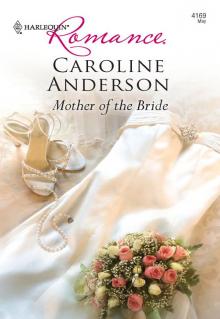 Mother of the Bride
Mother of the Bride Their Meant-to-Be Baby
Their Meant-to-Be Baby Best Friend to Wife and Mother?
Best Friend to Wife and Mother? Their Own Little Miracle
Their Own Little Miracle The Valtieri Marriage Deal
The Valtieri Marriage Deal Maternal Instinct
Maternal Instinct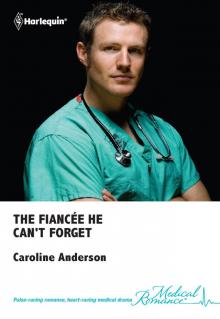 The Fiancé He Can't Forget
The Fiancé He Can't Forget From Christmas to Eternity
From Christmas to Eternity Holding Out For a Hero
Holding Out For a Hero Bound by Their Babies
Bound by Their Babies The Ideal Choice
The Ideal Choice SNOWED IN WITH THE BILLIONAIRE
SNOWED IN WITH THE BILLIONAIRE The Perfect Christmas
The Perfect Christmas The Baby Question
The Baby Question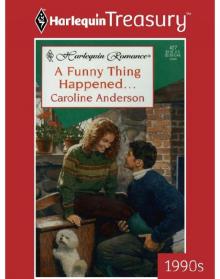 A Funny Thing Happened...
A Funny Thing Happened... Practically Perfect
Practically Perfect A Wife and Child to Cherish (Audley Memorial Hospital)
A Wife and Child to Cherish (Audley Memorial Hospital)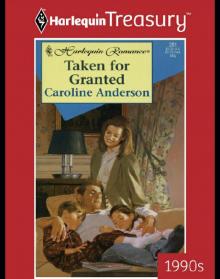 Taken For Granted
Taken For Granted The Midwife's Longed-For Baby
The Midwife's Longed-For Baby A Special Kind of Woman
A Special Kind of Woman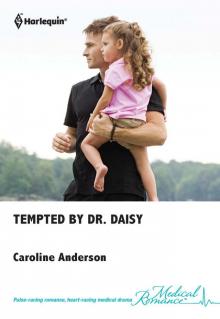 Tempted by Dr. Daisy
Tempted by Dr. Daisy A Mother by Nature
A Mother by Nature Accidental Rendezvous
Accidental Rendezvous His Very Own Wife and Child
His Very Own Wife and Child The Surgeon's Miracle
The Surgeon's Miracle Their Miracle Baby
Their Miracle Baby The Valtieri Baby
The Valtieri Baby The Single Mom and the Tycoon
The Single Mom and the Tycoon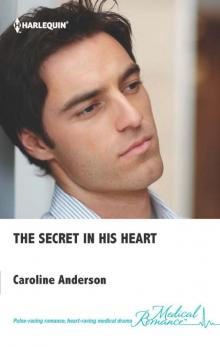 The Secret in His Heart
The Secret in His Heart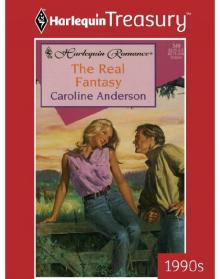 The Real Fantasy
The Real Fantasy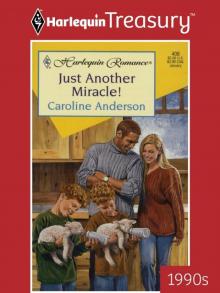 Just Another Miracle!
Just Another Miracle! A Very Single Woman
A Very Single Woman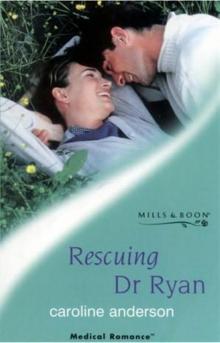 Rescuing Dr Ryan
Rescuing Dr Ryan St. Piran's: The Wedding of The Year
St. Piran's: The Wedding of The Year Accidental Seduction
Accidental Seduction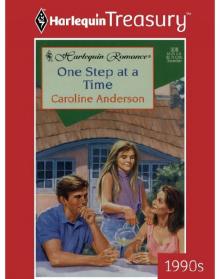 One Step At A Time
One Step At A Time A Perfect Hero
A Perfect Hero